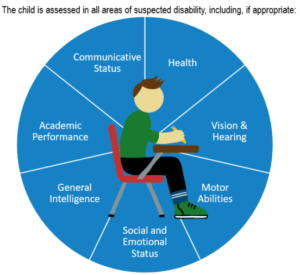As parents, we often have questions about the initial evaluation process. Here are some answers to those frequently asked questions.
When will the evaluation be completed?
If this is the initial evaluation, it is required to be completed within 45 school days (with some exceptions) of the school gaining your consent to evaluate. There are exceptions to this timeline based on the date the evaluation is requested (was it within 35-45 days from last school day or during the summer) or if your child was absent.
If this is a reevaluation, the ARD Committee, which includes you, should decide together when the evaluation should be completed and document this date within the IEP.
What is included in the evaluation?

As part of the evaluation, the evaluator(s) must:
- Assess your child in all areas where he or she may have a disability. This includes health, vision, hearing, social-emotional, general intelligence, academic performance, communication, and physical abilities.
- Use different strategies and valid (acceptable) and reliable (dependable) assessments, to come up with your child’s developmental and academic functioning. This ensures the assessment tests what it is designed to test, if not; the results are questionable and can’t be used to decide eligibility.
- Use assessments that are specific to the suspected or diagnosed disability. For example, if a child is suspected of or diagnosed with a vision or hearing problem or autism, the district must use tests and follow evaluation procedures specific to those disabilities.
- Include information given by you that may help in making a decision. Your information can help decide whether your child has a disability. It will also help decide the education services your child will need to be involved in and improve in the general education curriculum.
- Use tests that do not discriminate based on race, culture, disability and gender.
- Do the evaluation in the child’s native language (for example, Spanish) or other types of communication (for example, sign language).
- Know how to give the tests they decide to use, and give each test according to its instructions.
As part of the evaluation, the evaluator(s) should:
- Include the observations and opinions of professionals who have worked with your child;
- Include medical information that has to do with your child’s learning.
Where and when will the evaluation take place?
The evaluator(s) should meet with you at a time and place that is fit for the evaluation and convenient to you, your child, and the evaluator(s). All evaluators may assess your child on the same day and at the same time. If this is not the best way to evaluate your child, let the school know ahead of time. This way the school has time to prepare.
How much does an evaluation cost?
Thankfully, school district evaluations are provided at no cost to parents.
How can I prepare for the evaluations?
Preparing your child for testing can reduce anxiety and encourage cooperation during the tests. Here are some tips to help you and your child prepare for the evaluation.
- Get your child and yourself to bed early and have a healthy breakfast. If your child is tired, sleepy, cranky and hungry, then he or she will not be at his or her best. This may negatively affect the test scores and results.
- It’s only natural to have many questions about the process. To ease your doubts, write a list of questions to ask the evaluator so you don’t forget any important details.
- It’s a good idea to prepare a student portfolio to share with the evaluation team. In this portfolio you can include information about how your child learns and gets along with you and others. You should also take note of what your child likes, dislikes, finds difficult, and is good at, for example. For more guidance on student portfolios go to, How to Create a Student Portfolio.
- Discuss the evaluation ahead of time with your child. Take his age into consideration when planning what to tell him. Assure him that the adults he will meet are there to learn how best to help. Encourage them to be themselves.
- If you need to bring someone to support you during the process, be sure you notify the school ahead of time.
Who is involved?
- Parents
- Student/child
- An evaluation team that must include, but is not limited to:
- A licensed specialist in school psychology
- An educational diagnostician
- Other appropriately certified or licensed practitioner with experience and training in the area of disability. Go to the Legal Framework for the Child Centered Special Education Process for more information on the required credentials for the evaluation team.
- Someone who can interpret in the language of the family and the evaluations.
- A Special Education and/or a regular education teacher.
- Representatives from other programs that can share information about your child, for example, Early Childhood Intervention (ECI), Head Start providers, therapists and Health & Human service agencies.
Parents may want to see the test results at the end of each evaluation. Do expect for the evaluator to give you a general overview rather than a detailed account of his or her findings/scores. This is because observations made and other information collected needs to be carefully looked at first. The evaluators must make sure everything adds up before reaching and revealing their final decision.
Also, parents are not always included in the evaluation area or room for part of or the entire duration of the evaluation. Remember part of the evaluation is to determine if your child needs any special supports/services to benefit from their education. When children are in school they do not have their parents in the classroom with them. So an evaluator may want to see how a child will perform without mom or dad in the room. The evaluator may also ask to see the child alone because:
- Evaluations are meant to give a picture of how your child performs in a variety of settings, with different people, and under different circumstances.
- The evaluation tests often have specific instructions that the evaluator can not change.
- The child may be too distracted and can’t perform for the test with a family member in the room.
What happens after the evaluation is completed?
Within 30 calendar days of completing the full initial and independent evaluation, the ARD committee (this includes parents) will meet to discuss the evaluation report and create an IEP if your child is eligible or discuss other options if your child is not eligible. Always request a copy of the evaluation report BEFORE you meet with school.
Additional Resources
Texas Education Agency Timeline




